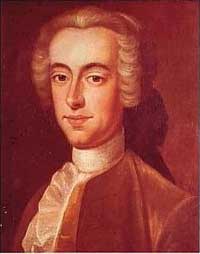Thomas Hutchinson (governor): Difference between revisions
No edit summary |
→Footnote: drop trivia |
||
| Line 30: | Line 30: | ||
==Footnote== |
|||
His son-in-law was both a nephew of [[Massachusetts]] Lt. Gov. [[Andrew Oliver]] and a great-nephew of [[Massachusetts]] [[Governor]] [[Jonathan Belcher]]. |
|||
*[[Anne Hutchinson]] lineage goes back to [[William the Conqueror]] of England |
|||
{{Wikiquote}} |
{{Wikiquote}} |
||
Revision as of 06:04, 1 November 2006
Thomas Hutchinson (September 9 1711 – June 3 1780) was the American colonial governor of Massachusetts from 1771 to 1774 and a prominent Loyalist in the years before the American Revolutionary War.

Hutchinson was born in Boston, where his father, the great-grandson of Anne Hutchinson, was a wealthy merchant and ship owner. He was a highly intelligent man who graduated from Harvard in 1727 before his sixteenth birthday. He entered his father's counting room, early showed remarkable aptitude for business, and by the time he was 24 had accumulated considerable property in trading ventures on his own account. He married Margaret Sanford in 1734-a granddaughter of Rhode Island Governor Peleg Sandford and a great granddaughter of both Rhode Island Governor William Coddington and of Anne Hutchinson.
As his career advanced he became involved in the civil leadership of the colony, first as a selectman in Boston in 1737. Later in the same year he was chosen a representative to the General Court of the Colony and at once took a strong stand in opposition to the views of the majority with regard to a proper currency. His unpopular opinions led to his retirement in 1740. In that year he went to England as a commissioner to represent Massachusetts in a boundary dispute with New Hampshire. In 1742 he was re-elected to the General Court, and was chosen annually to the General Court until 1749, serving as the Speaker from 1746 to 1749. He continued his advocacy of a sound currency, and when the British Parliament reimbursed Massachusetts in 1749 for the expenses incurred in the Louisburg expedition, he proposed the abolition of the bills of credit, and the utilization of the parliamentary repayment as the basis for a new Colonial currency. The proposal was finally adopted by the Assembly, and its good effect on the trade of the Colony at once established Hutchinson's reputation as a financier.
On leaving the General Court in 1749 he was appointed at once to the Governor's Council. In 1750 he was chairman of a commission to arrange a treaty with the Indians in the District of Maine, and he served on boundary commissions to settle disputes with Connecticut and Rhode Island. In 1752 he was appointed judge of probate and a justice of the Common Pleas. In 1754, as a delegate from Massachusetts to the Albany Convention, he took a leading part in the discussions and favored Franklin's plan for Colonial union.
In 1758 he was appointed Lieutenant Governor, and in 1760 Chief Justice, of the Province. In the following year, by issuing writs of assistance, he brought upon himself a storm of protest and criticism. His distrust of popular government as exemplified in the New England town meeting increased. Although he opposed the principle of the Stamp Act, considered it impolitic, and later advised its repeal, he accepted its legality, and, as a result of his stand, his city house was sacked by a mob in August, 1765, and his valuable collection of books and manuscripts destroyed.
In 1769, upon the resignation of Governor Francis Bernard, he became acting Governor, serving in that capacity at the time of the Boston Massacre, March 5, 1770, when popular clamor compelled him to order the removal of the troops from the city.
In March, 1771, he received his commission as Governor, and was the last civilian governor of the Massachusetts colony. His administration, controlled completely by the British ministry, increased the friction with the patriots. The publication, in 1773, of some letters on Colonial affairs written by Hutchinson, and obtained by Franklin in England, still further aroused public indignation, and led the ministry to see the necessity for stronger measures. The temporary suspension of the civil government followed, and General Gage was appointed military governor in April, 1774. Driven from the country by threats in the following May and broken in health and spirit, Hutchinson spent the rest of his life an exile in England.
Hutchinson had built a country estate in Milton, Massachusetts. Although the house is now gone, the original "ha-ha" of the estate remains today beside Governor Hutchinson's Field, maintained by the Trustees of Reservations.
In England, still nominally Governor, he was consulted by Lord North in regard to American affairs; but his advice that a moderate policy be adopted, and his opposition to the Boston Port Bill, and the suspension of the Massachusetts constitution, were not heeded.
His American estates were confiscated, and he was compelled to refuse a baronetcy on account of lack of means. He died at Brompton, now a part of London, aged 68.
He wrote a History of Massachusetts Bay (volume i, 1764; volume ii, 1767; volume iii, 1828) a work of great historical value, calm, and judicious in the main, but entirely unphilosophical and lacking in style. His Diary and Letters was published in 1884–86.
This article incorporates text from a publication now in the public domain: Gilman, D. C.; Peck, H. T.; Colby, F. M., eds. (1905). New International Encyclopedia (1st ed.). New York: Dodd, Mead. {{cite encyclopedia}}: Missing or empty |title= (help)
Literature
- Bernard Bailyn, The Ordeal of Thomas Hutchinson (Cambridge, 1974)
- J. K. Hosmer, Life of Thomas Hutchinson (Boston, 1896)
- Vernon Parrington, Main Currents in American Thought (1927), online

